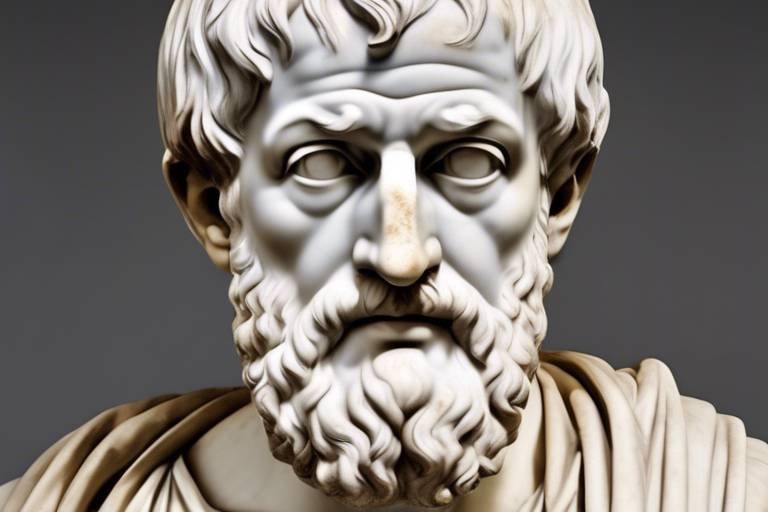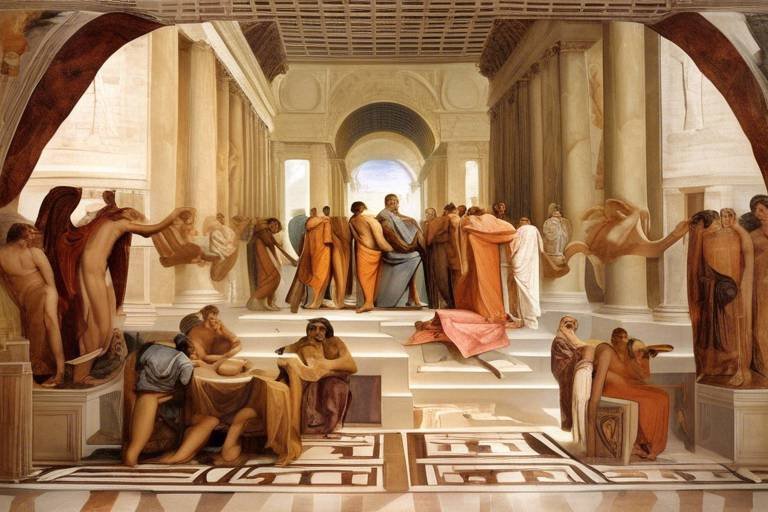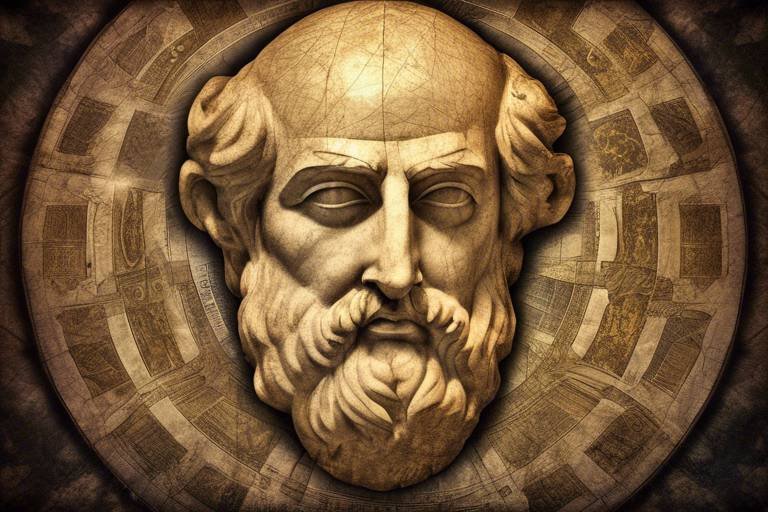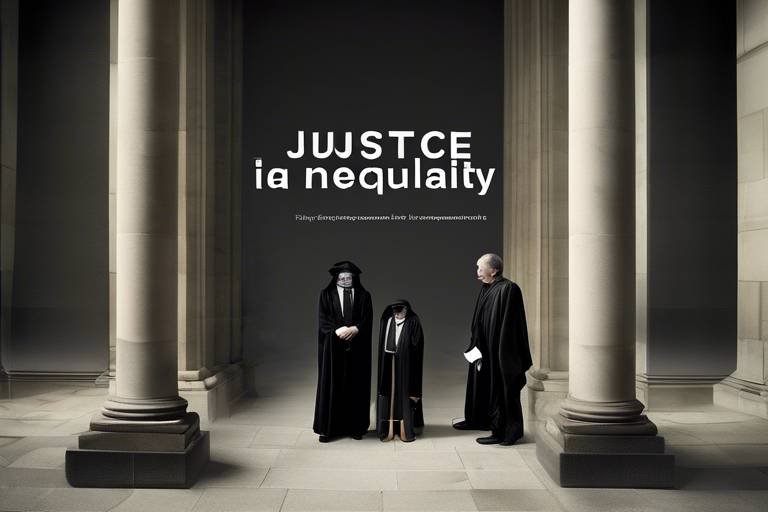Nietzsche and Existentialism - A Philosophical Examination
This article explores the intricate relationship between Nietzsche's philosophy and existentialism, highlighting key concepts, influences, and implications for modern thought and individual existence. The fusion of these two philosophical schools offers a profound lens through which we can examine our lives, our choices, and the very essence of what it means to be human. Imagine standing at the crossroads of existence, where the weight of tradition meets the lightness of individual choice; this is the space where Nietzsche and existentialism converge.
Nietzsche's philosophy revolves around the concepts of will to power, eternal recurrence, and the Übermensch, challenging traditional moral values and encouraging individuals to create their own meaning in life. At its core, Nietzsche's thought is a clarion call for personal empowerment. He famously declared that “God is dead,” not as a mere proclamation of atheism, but as a recognition that traditional sources of meaning and morality have lost their authority in the modern world. This sets the stage for individuals to forge their own paths, free from the constraints of societal norms.
Existentialism emphasizes individual freedom, choice, and the search for meaning in an indifferent universe. It posits that life is inherently devoid of meaning, and it is up to each person to create their own significance. Key figures such as Sartre, Camus, and Kierkegaard have contributed to this rich philosophical tapestry. These thinkers grappled with the absurdity of existence, the weight of personal responsibility, and the quest for authenticity in a world that often feels chaotic and meaningless. Existentialism invites us to confront uncomfortable truths about our existence and to embrace the freedom that comes with acknowledging our own agency.
Nietzsche's ideas significantly shaped existentialist thinkers like Sartre and Camus, who embraced his challenge to conventional morality and explored themes of absurdity, freedom, and authenticity in their works. For instance, Sartre's notion of “existence precedes essence” echoes Nietzsche's call for individuals to define themselves in a world without predetermined values. Similarly, Camus’ concept of the absurd aligns with Nietzsche’s idea that life lacks inherent meaning, compelling individuals to confront the void and find their own purpose.
This subsection discusses how Nietzsche's concept of freedom aligns with existentialist views, emphasizing the individual's responsibility to create meaning and navigate the challenges of existence. Nietzsche champions the idea that true freedom comes from within; it is not merely the absence of constraints but the active engagement in the creation of one's life narrative. This resonates deeply with existentialist thought, which posits that with great freedom comes great responsibility. We cannot escape the choices we make, and it is through these choices that we carve out our identities.
Here, we examine the connection between Nietzsche's ideas and the concept of the absurd, exploring how both philosophies confront the lack of inherent meaning in life. Nietzsche’s perspective encourages us to embrace the chaos and uncertainty of existence. Rather than despairing in the face of absurdity, he suggests we can find strength in our ability to affirm life, despite its inherent challenges. This affirmation is not a denial of suffering but an acknowledgment that it is through suffering that we often find our greatest insights and growth.
While Nietzsche laid the groundwork for existentialism, his views diverge from those of other existentialists, particularly concerning nihilism and the affirmation of life. Nietzsche’s philosophy can be seen as a response to nihilism, advocating for the creation of values in a world where traditional moral frameworks have crumbled. In contrast, some existentialists may dwell in the despair of nihilism, viewing it as a dead end rather than a starting point for personal empowerment.
The concept of the Übermensch is central to Nietzsche's philosophy, symbolizing the ideal individual who transcends societal norms. This idea resonates with existentialist themes of personal authenticity and self-creation. The Übermensch is not merely a superhuman but represents an individual who has the courage to define their own values and live authentically. In a world filled with distractions and societal pressures, the pursuit of becoming an Übermensch is a profound challenge that invites us to reflect on our own lives.
This section delves into how Nietzsche's call to create personal values challenges existentialists to confront the void of traditional morality and forge their own paths in life. In the absence of universal truths, Nietzsche urges us to become the architects of our own moral codes. This is a daunting task, but it is also liberating; it allows us to break free from the shackles of inherited beliefs and to construct a life that truly reflects our desires and aspirations.
Suffering plays a crucial role in both Nietzschean and existentialist philosophies, serving as a catalyst for personal growth and deeper understanding of one's existence and purpose. Nietzsche famously said, “What does not kill me makes me stronger,” highlighting the transformative potential of suffering. In existentialism, suffering is often seen as an inevitable part of the human condition, but it is also through suffering that we can discover our authentic selves and gain clarity about our values and desires.
- What is the main difference between Nietzsche and other existentialists? Nietzsche emphasizes the creation of personal values, while some existentialists focus more on the despair of nihilism.
- How does suffering contribute to personal growth? Both Nietzsche and existentialists view suffering as a necessary experience that can lead to deeper understanding and resilience.
- What is the significance of the Übermensch? The Übermensch represents the ideal individual who transcends societal norms and creates their own values.

The Essence of Nietzsche's Philosophy
Friedrich Nietzsche, a titan of modern philosophy, challenges us to rethink our understanding of morality, existence, and the very fabric of reality. At the heart of his philosophy lies the concept of the will to power, which posits that the fundamental driving force in humans is not merely survival or reproduction, but rather a deep-seated desire to assert and enhance one’s own power and influence. This idea flips the traditional view of human motivation on its head, suggesting that our actions are not just reactions to external circumstances but are also expressions of our inner strength and ambition.
Another cornerstone of Nietzsche's thought is the notion of eternal recurrence. Imagine living your life over and over again, exactly as you are living it now. Would you embrace the life you lead, or would you recoil in horror? This radical idea forces individuals to confront their choices and the meaning they ascribe to their existence. If we were to live the same life repeatedly, it becomes imperative to live authentically and with intention, making choices that resonate deeply with our true selves.
Furthermore, Nietzsche introduces the concept of the Übermensch, or "Overman," which symbolizes the ideal individual who transcends the constraints of societal norms and conventional morality. The Übermensch is not bound by the values imposed by society; instead, this figure creates their own values, embodying the ultimate expression of human potential. This idea resonates profoundly with existentialist themes, where personal authenticity and self-creation are paramount. Nietzsche encourages us to break free from the shackles of herd mentality and to embrace the freedom that comes with self-definition.
Nietzsche's philosophy is not merely a critique of traditional values; it is a clarion call for individuals to engage in a profound self-examination and to cultivate their own paths. In a world that often feels chaotic and devoid of meaning, Nietzsche's insights provide a framework for navigating existence with courage and creativity. He urges us to reject nihilism—the belief that life is meaningless—and instead to forge our own meanings in the face of an indifferent universe.
To summarize, Nietzsche's philosophy can be distilled into several key elements:
- Will to Power: The intrinsic drive to assert and enhance one's existence.
- Eternal Recurrence: The challenge of embracing life in its entirety as if it were to be lived repeatedly.
- Übermensch: The ideal individual who creates their own values and transcends societal norms.
In conclusion, Nietzsche's philosophy is a rich tapestry of ideas that encourages individuals to confront the complexities of existence, embrace their freedom, and ultimately, create their own meanings. His thoughts not only challenge us to rethink our relationship with morality but also inspire us to live authentically in a world that often seems devoid of inherent purpose.

Existentialism: An Overview
Existentialism is a philosophical movement that places the individual at the center of existence, emphasizing personal freedom, choice, and the quest for meaning in a world that often appears indifferent or chaotic. At its core, existentialism grapples with profound questions about human existence, such as: What does it mean to live authentically? How do we find meaning in a seemingly meaningless universe? These questions resonate deeply with anyone who has ever felt lost or overwhelmed by the complexities of life.
The movement gained momentum in the 20th century, influenced by earlier thinkers like Søren Kierkegaard and Friedrich Nietzsche, who laid the groundwork for existential thought. However, it was figures such as Jean-Paul Sartre, Simone de Beauvoir, and Albert Camus who brought existentialism into the mainstream, articulating its principles in various forms of literature and philosophy. Existentialism is not merely a set of ideas; it's a call to action, urging individuals to confront their existence and take responsibility for their choices.
One of the defining characteristics of existentialism is its emphasis on individualism. Unlike traditional philosophies that may rely on universal truths or moral absolutes, existentialists argue that each person must create their own values and meaning. This idea can be both liberating and daunting. Imagine standing at a crossroads with multiple paths ahead—each path represents a different choice, a different life. The existentialist perspective encourages you to choose your path, but it also reminds you that the responsibility for that choice lies solely with you.
Moreover, existentialism often explores the theme of absurdity, which refers to the conflict between our search for meaning and the universe's apparent lack of it. Think of it like trying to find a rhyme in a poem that has none. This absurdity can lead to feelings of despair or nihilism, but existentialists argue that acknowledging this absurdity is the first step toward personal freedom. In this light, the struggle for meaning becomes an essential part of the human experience, a journey that each individual must undertake.
Existentialism is also concerned with the concept of authenticity. To live authentically means to act in accordance with one's true self and values, rather than conforming to societal expectations or external pressures. This pursuit of authenticity is not just a philosophical notion; it has practical implications for how we live our lives. It challenges us to ask ourselves: Are we living for ourselves or for others? Are our choices truly our own, or are they influenced by the world around us?
In summary, existentialism is a rich and complex philosophical movement that invites us to explore the depths of our existence. It encourages us to embrace our freedom, confront the absurdity of life, and strive for authenticity in our choices. As we delve deeper into this philosophical landscape, we uncover not just the struggles of existence, but also the profound beauty that comes from creating our own meaning in a world that often feels devoid of it.
- What is the main focus of existentialism? Existentialism primarily focuses on individual freedom, choice, and the search for meaning in life.
- Who are some key figures in existentialism? Important figures include Jean-Paul Sartre, Simone de Beauvoir, and Albert Camus.
- How does existentialism differ from other philosophical movements? Unlike other philosophies that may rely on universal truths, existentialism emphasizes personal responsibility and the creation of individual meaning.
- What role does absurdity play in existentialism? Absurdity highlights the conflict between our search for meaning and the universe's indifference, prompting individuals to find their own purpose.

Nietzsche's Influence on Existentialist Thinkers
Friedrich Nietzsche, often regarded as a revolutionary thinker, laid the groundwork for modern existentialism through his radical ideas that challenged the very fabric of traditional philosophy. His profound concepts of the will to power, eternal recurrence, and the Übermensch resonate deeply with existentialist themes, influencing a plethora of thinkers who followed in his wake. One cannot help but marvel at how his rejection of absolute truths and moral absolutes opened the floodgates for existentialists like Jean-Paul Sartre and Albert Camus to explore the intricacies of human freedom and absurdity.
Nietzsche's philosophy presents a striking departure from conventional morality, urging individuals to embrace their freedom and create their own values. This notion of self-creation is pivotal in existentialism, where the absence of preordained meaning in life compels individuals to assert their own significance. For instance, Sartre famously declared that "existence precedes essence," a sentiment that echoes Nietzsche's call for personal responsibility and the rejection of externally imposed values. Both thinkers grapple with the implications of a world devoid of inherent meaning, yet Nietzsche's emphasis on the power of the individual to shape their destiny adds a unique dimension to existential thought.
Moreover, Nietzsche's exploration of the absurd serves as a cornerstone for existentialist discourse. He posits that life, much like a play without a script, often unfolds in chaotic and unpredictable ways. This perspective profoundly influenced Camus, who famously articulated the idea of the absurd hero in his work, "The Myth of Sisyphus." Sisyphus, condemned to roll a boulder up a hill only for it to roll back down, symbolizes the human struggle against the absurdity of existence. Through this lens, both Nietzsche and Camus invite us to confront life's inherent meaninglessness while simultaneously urging us to find joy in the struggle itself.
It is also essential to acknowledge that while Nietzsche's ideas profoundly shaped existentialism, they also diverge in significant ways. For example, Nietzsche's concept of nihilism—the belief that life lacks objective meaning—can be seen as both a challenge and a warning for existentialists. While he believed that one must transcend nihilism to create personal values, existentialists like Sartre and Camus embraced nihilism as a starting point for their philosophical inquiries. This divergence highlights the rich tapestry of existential thought, where Nietzsche's influence can be seen as both a foundation and a point of contention.
In summary, Nietzsche's philosophical contributions have left an indelible mark on existentialist thinkers. His emphasis on individual freedom, the challenge of the absurd, and the necessity of self-creation resonate throughout existentialism, shaping the discourse surrounding human existence in a world that often appears indifferent. As we delve deeper into the existentialist movement, it becomes clear that Nietzsche's legacy is not just a historical footnote but a vibrant thread woven into the fabric of contemporary thought.

Existential Freedom and Responsibility
When we dive into the heart of existentialism, we find a compelling notion: freedom is not just a gift; it’s a heavy burden. This idea resonates deeply with Nietzsche's philosophy. He believed that true freedom arises from an individual's ability to create their own values and meaning in a world that often feels chaotic and indifferent. Imagine standing at a crossroads with no signs to guide you. That’s the essence of existential freedom—it's exhilarating yet daunting.
Nietzsche's concept of the will to power plays a pivotal role here. He posited that each person has an innate drive to assert themselves and shape their reality. This drive isn’t about domination over others but rather about mastering oneself and one's circumstances. In this sense, freedom becomes intertwined with responsibility. To be free is to acknowledge that your choices define not only your life but also impact the lives of those around you.
Consider the implications of this freedom: when you choose to act, you are not just making a personal decision; you are also participating in the larger tapestry of human experience. This brings us to an essential question: how do we navigate this freedom responsibly? Nietzsche suggests that embracing our freedom means confronting the consequences of our actions. It’s about recognizing that we are architects of our own destinies, and with that comes the weight of responsibility.
To further illustrate this point, let’s break down the relationship between freedom and responsibility into key components:
| Component | Description |
|---|---|
| Self-Determination | The ability to make choices based on personal values and beliefs. |
| Awareness of Consequences | Understanding that every action has repercussions that extend beyond oneself. |
| Authenticity | Living in a way that is true to oneself, rather than conforming to societal expectations. |
| Engagement with Others | Recognizing that our choices affect the community and the world at large. |
In essence, existential freedom is not an escape from responsibility; rather, it is a call to embrace it fully. Nietzsche’s philosophy encourages us to step into our power, to recognize that while the universe may be indifferent, our choices can create ripples of meaning. This can be both liberating and terrifying—like standing on the edge of a cliff, ready to leap into the unknown.
Ultimately, the challenge lies in balancing this freedom with a sense of responsibility. It urges us to ask ourselves: how do we want to shape our lives? How do our choices reflect our values? In a world that often feels devoid of inherent meaning, the responsibility to create significance becomes a profound act of defiance against nihilism.

The Absurd and Nietzschean Philosophy
The concept of the absurd is a cornerstone in existentialist thought, and it finds intriguing parallels within Nietzschean philosophy. At its core, the absurd refers to the conflict between the human desire for meaning and the indifferent universe that offers none. This tension is palpable in Nietzsche's work, where he boldly asserts that life lacks inherent meaning, challenging us to confront this uncomfortable truth. Imagine standing at the edge of a vast, empty canyon—it's beautiful yet utterly silent, leaving you to ponder your existence. This is the essence of the absurd; it’s both exhilarating and daunting.
Nietzsche's philosophy encourages us to embrace this absurdity rather than shrink away from it. He famously declared that "God is dead," a provocative statement that encapsulates the idea that traditional sources of meaning—be they religious, moral, or societal—have crumbled. In this post-moral landscape, individuals are left grappling with their own existence. How do we find meaning when the universe seems to mock our search for it? Nietzsche suggests that we must become the creators of our own values. Just as an artist uses a blank canvas to express their vision, we must paint our own lives with purpose and significance.
In this context, the absurd can be seen as a catalyst for personal transformation. When faced with an indifferent universe, we have two choices: succumb to despair or rise to the challenge. Nietzsche advocates for the latter, urging individuals to confront the void with courage and creativity. He introduces the idea of the Übermensch, or "Overman," as a symbol of what we can become when we reject nihilism and embrace the freedom to define our own existence. The Übermensch embodies the spirit of overcoming the absurd, living authentically and fully in a world devoid of preordained meaning.
Moreover, the absurdity of life is not merely a burden; it can also be a source of profound liberation. By acknowledging that the universe is indifferent, we are freed from the shackles of societal expectations and dogmas. This liberation allows us to explore our true desires, passions, and potentials. Nietzsche’s philosophy encourages us to dance on the edge of the absurd, to revel in our freedom, and to create meaning through our actions and choices.
In summary, the relationship between the absurd and Nietzschean philosophy is a rich tapestry of challenges and opportunities. By facing the absurd head-on, we can transcend despair and forge our own paths. The embrace of the absurd not only aligns with existentialist themes but also serves as a powerful reminder of our capacity to create meaning in a world that offers none. So, are you ready to take that leap into the unknown and craft your own existence?
- What is the absurd in existentialism? The absurd refers to the conflict between the human desire for meaning and the chaotic, indifferent universe that offers none.
- How does Nietzsche’s philosophy relate to the absurd? Nietzsche’s philosophy embraces the absurd, encouraging individuals to create their own values and meaning in a world devoid of inherent purpose.
- What is the Übermensch? The Übermensch is a central concept in Nietzsche's philosophy, representing an ideal individual who transcends societal norms and creates their own values.
- How can one find meaning in an absurd world? By accepting the absurdity of existence and embracing personal freedom, individuals can create their own meaning through choices and actions.

Contrasting Nietzsche with Other Existentialists
When we delve into the realm of existentialism, it’s impossible to overlook the towering figure of Friedrich Nietzsche. His ideas laid a significant foundation for existentialist thought, yet there are crucial distinctions between his philosophy and that of other existentialists like Jean-Paul Sartre and Albert Camus. While Nietzsche championed the idea of creating one's own values in a world devoid of inherent meaning, many existentialists took a different approach, particularly regarding the implications of nihilism.
Nietzsche’s philosophy is often characterized by his rejection of traditional moral structures, which he saw as life-denying. He famously declared that “God is dead,” a provocative statement that illustrates his belief that the decline of religious and metaphysical worldviews has left humanity in a moral vacuum. In contrast, existentialists like Sartre embraced this vacuum but viewed it through a lens of freedom and responsibility. For Sartre, the absence of a predetermined essence means that individuals must confront the absurdity of existence and create their own meaning. This divergence raises an essential question: Is the absence of intrinsic values liberating or terrifying?
Moreover, while Nietzsche emphasized the concept of the Übermensch—a figure who transcends societal norms and creates personal values—other existentialists often focused on the struggle of the individual within a chaotic universe. For instance, Camus introduced the notion of the absurd hero, epitomized by Sisyphus, who finds meaning in the struggle itself rather than in any ultimate purpose. This highlights a critical contrast: Nietzsche’s vision is one of affirmation and self-overcoming, while existentialists like Camus often grapple with the futility of existence.
To further illustrate these contrasts, let’s consider a table that summarizes key differences between Nietzsche and other existentialists:
| Philosopher | Key Concept | View on Nihilism | Approach to Meaning |
|---|---|---|---|
| Friedrich Nietzsche | Übermensch | Overcoming nihilism through personal value creation | Affirmative; life is a canvas for self-creation |
| Jean-Paul Sartre | Existential Freedom | Embrace of nihilism as a catalyst for freedom | Individual responsibility to create meaning |
| Albert Camus | The Absurd Hero | Acceptance of the absurdity of life | Finding meaning in the struggle itself |
Ultimately, the contrasts between Nietzsche and other existentialists reveal a rich tapestry of thought. While Nietzsche’s philosophy is often seen as a rallying cry for self-empowerment and the creation of personal values, other existentialists grapple with the implications of a world stripped of inherent meaning. This divergence invites us to reflect on our own existence: Are we creators of our destiny, or are we merely navigating the chaos of an indifferent universe? In this ongoing dialogue between Nietzsche and his existentialist successors, we find a profound exploration of human existence that continues to resonate today.

The Übermensch and Individualism
The concept of the Übermensch, or "Overman," is one of the cornerstones of Friedrich Nietzsche's philosophy. It represents an idealized individual who transcends the limitations imposed by societal norms, conventional morality, and herd mentality. Nietzsche envisioned the Übermensch as a figure who creates their own values and meaning in a world that often feels devoid of inherent purpose. This idea resonates deeply with the principles of individualism, a key theme in existentialist thought. The Übermensch is not just a character; it embodies the aspiration for personal authenticity and self-creation, encouraging individuals to break free from the chains of mediocrity and societal expectations.
In many ways, the Übermensch serves as a challenge to each person to embrace their uniqueness and strive for greatness. Nietzsche believed that individuals should not merely accept the values handed down to them but should actively engage in the process of value creation. This concept can be likened to an artist who, instead of replicating existing works, seeks to create a masterpiece that reflects their personal vision. Just as an artist faces the blank canvas, individuals are faced with the vast expanse of existence and the opportunity to paint their own lives with the colors of their choices.
Moreover, the path to becoming an Übermensch is fraught with challenges. Nietzsche acknowledged that this journey requires immense courage and the willingness to confront discomfort. It is about embracing one’s strengths and weaknesses alike, and using them as tools for personal growth. The struggle against societal pressures and the quest for authenticity can be likened to climbing a mountain; the ascent is steep and often perilous, but the view from the summit—an authentic life lived on one’s own terms—is profoundly rewarding.
Nietzsche's vision of the Übermensch also invites us to consider the implications of individualism in a collective society. While individualism celebrates the self, it can sometimes clash with the demands of community and social responsibility. Nietzsche does not advocate for selfishness or disregard for others; rather, he promotes a form of individualism that encourages individuals to uplift themselves and, in doing so, inspire others to do the same. This creates a dynamic where personal growth can lead to collective enhancement, allowing society to flourish through the contributions of its most authentic members.
In essence, the Übermensch is a beacon of hope in a world often overshadowed by nihilism and despair. It serves as a reminder that, even in the face of a seemingly indifferent universe, we have the power to forge our own destinies. As we ponder Nietzsche's ideas, we are compelled to ask ourselves: What does it mean to live authentically? How can we embrace our individuality while contributing to the greater good? These questions resonate with the existentialist quest for meaning and challenge us to explore the depths of our own existence.
To further illustrate the relationship between the Übermensch and individualism, consider the following table that outlines key characteristics:
| Characteristic | Übermensch | Individualism |
|---|---|---|
| Value Creation | Creates personal values | Prioritizes self-defined principles |
| Authenticity | Embraces true self | Rejects societal norms |
| Responsibility | Takes ownership of choices | Values personal accountability |
| Community Impact | Inspires others through example | Encourages collective growth |
In conclusion, the concept of the Übermensch is not merely a philosophical abstraction; it is a call to action for all of us. It challenges us to reflect on our lives, to confront the void left by traditional values, and to embark on a journey of self-discovery and value creation. As we navigate the complexities of existence, the ideals of the Übermensch and individualism serve as guiding stars, illuminating our paths toward a more authentic and meaningful life.
- What is the Übermensch? The Übermensch is a concept introduced by Nietzsche representing an ideal individual who creates their own values and transcends societal norms.
- How does the Übermensch relate to individualism? The Übermensch embodies the principles of individualism by encouraging personal authenticity and self-creation, challenging individuals to define their own values.
- Is the pursuit of becoming an Übermensch attainable? While the journey to becoming an Übermensch is challenging, it serves as an aspirational goal encouraging personal growth and authenticity.
- Can individualism coexist with community values? Yes, Nietzsche's concept allows for individualism to inspire collective growth, where personal authenticity can enhance the community.

Creating Values in a Post-Moral World
In a world where traditional moral frameworks are increasingly questioned, Nietzsche's philosophy emerges as a powerful call to action. He challenges us to recognize that in the absence of a universal moral compass, we are not left adrift; rather, we are presented with an exhilarating opportunity to create our own values. This notion can be both liberating and daunting. Imagine standing at the edge of a vast, uncharted territory, with the freedom to map out your own journey—this is the essence of Nietzsche's idea of value creation.
Nietzsche posits that the decline of traditional morals, often referred to as nihilism, is not a cause for despair but a chance for rebirth. Instead of succumbing to a sense of meaninglessness, individuals are called to embrace their own existential freedom. This process involves a deep introspection, asking ourselves profound questions like: What do I truly value? What principles will guide my actions? In this post-moral landscape, the responsibility to define meaning falls squarely on our shoulders.
To navigate this complex terrain, Nietzsche encourages us to adopt a mindset of creativity and courage. He invites us to become the artists of our own lives, sculpting our values much like a painter brings a canvas to life. This artistic approach to existence requires us to:
- Reflect deeply on personal experiences and beliefs.
- Challenge societal norms that may not resonate with our true selves.
- Embrace the chaos and uncertainty that comes with forging new paths.
However, creating values is not merely an individualistic endeavor; it also involves recognizing the interconnectedness of our choices. The values we create can have a ripple effect, influencing those around us. Thus, Nietzsche's call to value creation is also a call to responsibility. It prompts us to consider how our values align with the greater good, fostering a sense of community while remaining true to our individual authenticity.
In essence, Nietzsche's vision of a post-moral world is one where we become active participants in shaping our destinies. It’s a world that encourages us to transcend the limitations of inherited values and to boldly declare what we stand for. As we venture into this uncharted territory, we must remember that every choice we make is a brushstroke on the canvas of our lives, contributing to a masterpiece uniquely our own. So, are you ready to pick up the brush?
- What does Nietzsche mean by "creating values"?
Nietzsche suggests that in a world devoid of absolute morals, individuals have the freedom and responsibility to define their own values based on personal beliefs and experiences. - How does this idea apply to modern society?
In contemporary society, where traditional morals are often questioned, Nietzsche's philosophy encourages individuals to critically assess their beliefs and actively construct a meaningful life. - Is value creation a solitary process?
While it begins with individual reflection, creating values can also involve community engagement and dialogue, as our choices can impact others.

The Role of Suffering in Existential Thought
Suffering is often seen as a negative experience, something we strive to avoid at all costs. However, in the realm of existential thought, suffering takes on a profound significance. Think about it: many of the most transformative moments in our lives arise from pain and hardship. This is where existentialists like Nietzsche come into play, offering a perspective that challenges us to reconsider our relationship with suffering. Rather than viewing it solely as a burden, Nietzsche and other existentialists invite us to see it as an essential aspect of the human experience that can lead to personal growth and deeper understanding.
Nietzsche famously stated, "What does not kill me makes me stronger." This idea encapsulates the existential belief that suffering can lead to resilience and strength. When we confront our pain, we are forced to wrestle with our existence and the meaning we assign to it. This process can be likened to forging metal; the heat and pressure of suffering can shape us into stronger, more resilient beings. In fact, many existentialists argue that it is through suffering that we can truly discover who we are.
Moreover, suffering serves as a catalyst for authenticity. When we experience hardship, we are stripped of the superficial layers that often define our identities. In those moments of vulnerability, we are compelled to confront our true selves, leading to a more authentic existence. This aligns with Nietzsche's concept of the Übermensch, or "Overman," who embraces suffering as a means of transcending societal norms and creating personal values. By embracing suffering, individuals can break free from the constraints imposed by society and cultivate a life that is genuinely their own.
To illustrate this point further, consider the following ways in which suffering plays a role in existential thought:
- Self-Discovery: Suffering forces individuals to confront their beliefs, values, and desires, leading to greater self-awareness.
- Empathy and Connection: Experiencing suffering can foster empathy towards others, creating deeper connections and understanding.
- Meaning-Making: The struggle with suffering often leads individuals to seek or create meaning in their lives, which is a core tenet of existentialism.
In conclusion, suffering is not merely an obstacle to be overcome; it is a vital part of the existential journey. By embracing our pain and using it as a tool for growth, we can navigate the complexities of existence with greater authenticity and purpose. As we reflect on our own experiences of suffering, we might ask ourselves: How has pain shaped who I am today? What lessons can I draw from my struggles? These questions can lead to a richer understanding of our lives and the world around us, ultimately guiding us towards a more meaningful existence.
- What is the significance of suffering in existential philosophy?
Suffering is viewed as a catalyst for personal growth, self-discovery, and the creation of meaning in an indifferent universe.
- How does Nietzsche perceive suffering?
Nietzsche sees suffering as an essential aspect of life that can lead to strength, resilience, and authenticity.
- Can suffering lead to positive outcomes?
Yes, many existentialists argue that suffering can foster empathy, deeper connections, and a more profound understanding of oneself.
Frequently Asked Questions
- What is the main idea behind Nietzsche's philosophy?
Nietzsche's philosophy centers around the will to power, the idea of eternal recurrence, and the concept of the Übermensch. He challenges traditional moral values and advocates for individuals to create their own meaning in life, rather than adhering to imposed societal norms.
- How does existentialism relate to Nietzsche's ideas?
Existentialism shares Nietzsche's emphasis on individual freedom and the quest for meaning in a seemingly indifferent universe. Thinkers like Sartre and Camus were influenced by Nietzsche's challenge to conventional morality, exploring themes of absurdity, freedom, and authenticity in their works.
- What is the significance of the Übermensch?
The Übermensch represents the ideal individual who transcends societal norms and embodies personal authenticity. This concept resonates with existentialist themes of self-creation, urging individuals to define their own values and purpose in a post-moral world.
- How does suffering play a role in Nietzschean and existentialist thought?
Suffering is viewed as a vital element in both philosophies, acting as a catalyst for personal growth and a deeper understanding of one's existence. It challenges individuals to confront their circumstances and forge meaning from their experiences.
- What distinguishes Nietzsche from other existentialists?
While Nietzsche laid the groundwork for existentialism, he diverged from other existentialists in his views on nihilism and the affirmation of life. His perspective encourages embracing life fully, even in the face of inherent meaninglessness, which contrasts with the more pessimistic interpretations of other existential thinkers.
- Can Nietzsche's ideas be applied to modern life?
Absolutely! Nietzsche's concepts of creating personal values and embracing individual freedom are highly relevant today. They encourage people to take charge of their lives, cultivate authenticity, and navigate the complexities of modern existence with a sense of purpose.



















